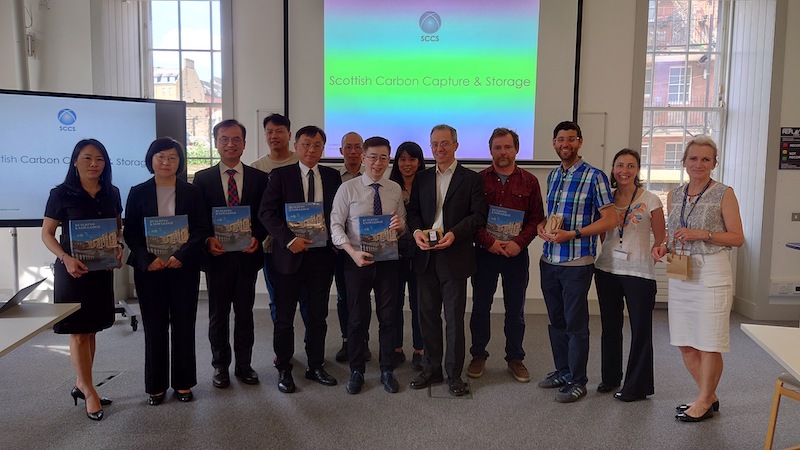On the 21st of June, a delegation of senior officials from Taiwan’s National Science and Technology Council (NSTC) and academic researchers visited SCCS at the Edinburgh Climate Change Institute (ECCI). They were welcomed by the SCCS team and Prof. Bryne Ngwenya, Head of the School of GeoSciences, at The University of Edinburgh.
In his opening remarks, Prof. Ngwenya provided a brief overview of the School’s research areas, highlighting its commitment to understanding the impact of climate on the Earth's environment and ecosystems, as well as the socio-economic, cultural and political implications for society. His address was followed by Lin Minn-Tsong, Deputy Minister of NSTC, who outlined the Council’s role in preparing research and development strategies to reduce Taiwan’s carbon emissions and mitigate climate change.He invited delegates to briefly introduce themselves before Prof. Hao Kuo-Chen, National Taiwan University, gave a presentation on Taiwan’s net-zero transition plans.
Hydrogen power generation and carbon capture, usage and storage (CCUS) technologies are expected to have an important role in achieving the country’s goal of net-zero emissions by 2050. Prof. Kuo-Chen presented a short and a medium-to-long term roadmap for hydrogen development and Taiwan’s ambitions for CCUS. Based on the performance of existing pilot plants, by 2030, CCUS could reduce carbon emissions by 4.6 million tons. With further research into potential storage sites, improvements in regulation and public outreach initiatives, a carbon emissions reduction of 40.2 million tons could be achieved by 2050. Using captured CO2 to make cement and acetic acid are some of the CCU applications currently being tested in Taiwan.
Delegates were able to learn more about the SCCS partnership and the Scottish Net Zero Roadmap from Dr Gillian White, SCCS Programme Manager, and about the latest research into hydrogen and CCS storage sites in Europe from Dr Andrew Cavanagh, CCS & Hydrogen Research Officer at SCCS.
Following the presentations, there was an opportunity to further discuss technology development strategies and exchange parting gifts.
“We were delighted to welcome a delegation from Taiwan, discuss their plans to advance the development of net-zero technologies and explore possible areas for future collaboration,” said Dr White.
The delegation also visited the School of Geosciences at The University of Aberdeen, where they met SCCS Director Prof. Clare Bond. She presented some of the work carried out by the Just Transition Lab, which is looking at the impact of the energy transition to net-zero on workers, communities, and society in the North East of Scotland.
“As we transition from global energy supplies dominated by fossil fuels, we need to use this opportunity to create a just and fairer society. CCS is one element in a portfolio of transition technologies which we can use to help achieve this aim. We need to work locally and globally and we look forward to working with all partners at all levels to realise this opportunity and to change for the better.” said Prof. Clare Bond.
“We had a very warm, friendly and positive meeting in Edinburgh with representatives from Taiwan’s National Science and Technology Council and are looking forward to further interactions and knowledge sharing activities on CCS and Hydrogen research. I am glad that the delegation expressed their interest in meeting SCCS partners based at the University of Aberdeen, an important member of the partnership with strong research interests in CO2 storage and CO2 conversion,” said Dr Romain Viguier, Business Development Manager for SCCS.


